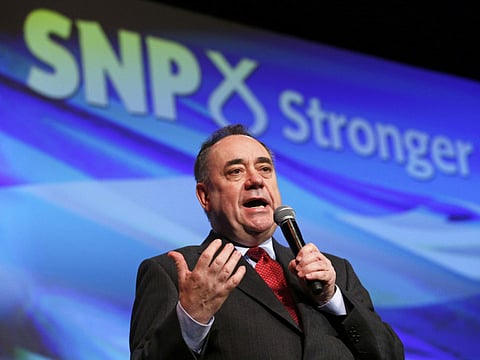England’s arrogant nationalism has been a gift to SNP
The Westminster set has failed to understand the Scottish nationalist movement

Befuddlement is the English virtue — or is it the English vice? It belies real anger, real outrage, and it is everywhere right now in the coverage of the election. It is a sentiment often voiced with amazement that what happens in Scotland will be a determining factor in what happens in our election. How dare the Scots be so damn influential?
This, after all, is not what we were told mattered, is it? For two years, we have been told that the key force in British politics was United Kingdom Independence Party (Ukip). Kippers, we were told each week as a different one said a different mad thing and had to resign, were the shape-shifters. Everything hinged on personalities, not issues. So, here, have another slice of Farage and ignore those interchangeable small Scottish women. What have they to do with the price of gilts?
Well, most of the political class and their embedded hacks have been entirely wrong: Things have changed, but not in ways they want to admit. The SNP will have a lot of influence — and Ukip will have Douglas Carswell. The disconnect between what has happened and what we were told was happening was forced out into the open with the barmy row of a leaked, quite possibly non-existent, memo. Nicola Sturgeon, a woman unknown to most English people until the leaders’ debates, was deemed dangerous and destructive because, frankly, she seems so capable. She was accused of double-dealing, of supporting the Tories rather than Labour. Someone, somewhere was trying to undermine her, although no English voter can vote for her.
It is incredible to me that Scottish independence was not taken seriously until two weeks before the referendum, while Farage, appearing ever-more incapable and self-centred, has been taken very seriously indeed. This tells you everything that is wrong with Westminster. It can only recognise its own, and in its own terms. Farage is recognisably one of its own – an ex-Tory broker – masquerading as an insurgent.
The independence movement headed by the SNP is not unproblematic, but its embodiment of a populist, civic nationalism remains something that both the Tory and Labour establishment see inherently as “other” and destabilising. An innate English arrogance sees the Scots’ desire for self-determination as actually being about England. And lo, this self-fulfilling prophecy is now being played out.
It suits the English not to see their own nationalism, to keep it vague with our unwritten constitution as a declaration of laissez-faire superiority. The fear that nationalism can only belong to the far-Right actually masks a national identity that is ever-more centralised around the political, cultural and financial dominance of London and the south-east.
The unthinking response of many on the Left to the rise of the Scottish National Party (SNP) — hardly a radical party — has been the mantra that “all nationalism is bad”, that Britain needs international cooperation in a globalised world. This argument is clearly inadequate as civic identities shift and inclusive national identities are taken up all around us.
The Left cannot cheer on Syriza or Podemos without seeing their connections to a particular terrain and history. Surely we know that when independence movements start, they don’t just stop: They morph, they resurface. The desire for self-determination seems to me a sensible response to those who feel utterly disenfranchised from the economic forces that control them. The SNP may simply preside over more austerity. Independence will continue to be fought for over a barrel of oil and its shifting price. There will be uncertainty. There always is.
This is the bit that bewilders the superficially polite English commentators and their attitude of “well, they lost a referendum and it is settled”. There is a refusal to understand that an organic social movement does not fall apart once it feels its own power. How can the SNP behave as if it won? Perhaps because it is engaging outside the bubble. It is the English view of politics here that looks very narrow. Were the Scots who lost merely never to speak of independence again? Who decides that these conversations are over? Go tell the Catalans to stop. Tell the Kurds not to call for a state of their own.
To speak of others’ nationalism as brash and vulgar is the very way that England enacts its own. The left does it as much at the right. This is a dead-eyed view that does not address that we are in an entirely new situation here. The English must have the conversation the Scots have had. It is happening right now anyway. It can be expressed through the politics of an insular and callous retro-identity — Ukip — or it can be expressed as an inclusive nationalism that extends outwards, but holds to its heart the necessity of citizens to have more say in their own destinies.
This refusal to countenance one version of English nationalism while at the same time enacting another via the utter negligence of entire parts of the United Kingdom is visible to anyone outside the political class. Or indeed anyone who gets on a train. This is why the British are not having the election they were told they would be having — one in which all that mattered was Nigel, the one in which English self-determination and supremacy were taken for granted. Ukip is fading while the SNP flames. The power balance is indeed shifting. It is time to speak about England.
— Guardian News & Media Ltd



